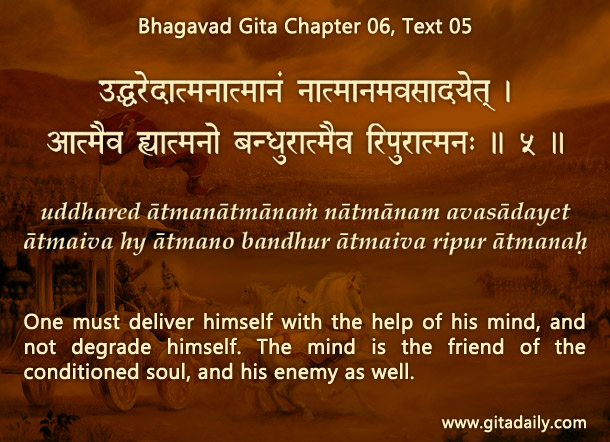Murderers who don’t want to leave any telltale signs by using a weapon sometimes smother their victims.
The mind acts with similar calculated malevolence while making people act self-destructively. Consider, for example, recovering alcoholics. When the craving hits them, alcohol feels as necessary as air. And when the hangover and remorse hits them, freedom from alcoholism feels as necessary as air; without such freedom, they know that they won’t ever live productively. Thus, their mind uses their addiction to smother them.
If they met someone who had earlier repeatedly prompted them to drink, they would resist that person’s prompts. They know implicitly that the prompter is different from them, with values and purposes that don’t necessarily coincide with their own. But when the mind similarly prompts them, they mistake its prompt to be their own desire, and act on it.
The Bhagavad-gita (06.05) indicates that the mind can function as both our enemy and our friend. The implication is that the mind is different from us and we need to treat it just as we would treat another person. If others prompted us to do something, we wouldn’t do it automatically, but would evaluate it on merit. We need to similarly evaluate the mind’s prompts.
Treating the mind as the other is extremely difficult because it lies inside us and we instinctively misidentify with whatever lies inside us. To get a torchlight for properly identifying the various forces populating our inner world, we need to regularly study the Gita. Further, when we apply the Gita’s guidelines for practicing bhakti-yoga, we experience spiritual reality that is far deeper, calmer and sweeter than the mundane reality the mind obsesses over.
Enriched with such spiritual education and experience, we can see the mind as the other and prevent it from smothering us.
To know more about this verse, please click on the image
Explanation of article:
Podcast:
Download by “right-click and save”


mind is the source of all ills and pleasures